
-
Find the right food for your petTake this quiz to see which food may be the best for your furry friend.Find the right food for your petTake this quiz to see which food may be the best for your furry friend.Featured products
 Perfect Digestion Small & Mini Adult Dog Food
Perfect Digestion Small & Mini Adult Dog FoodHill's Science Plan Perfect Digestion Small & Mini Adult Dog Food with Turkey is a complete premium pet food for small breed adult dogs aged 1–6 years. This deliciously smooth mousse is precisely balanced to deliver the appropriate amount of energy and to support digestive health in adult, small breed dogs.
Shop Now Perfect Weight Small & Mini Adult Dog Food
Perfect Weight Small & Mini Adult Dog FoodHill's Science Plan Adult Small & Mini Dog Food with Turkey is a complete premium pet food for adult small dogs from 1 year old that are prone to weight gain or slightly overweight. This deliciously smooth mousse is formulated to deliver the appropriate amount of energy to support weight maintenance in adult dogs.
Shop Now Hypoallergenic Small & Mini Adult Dog Food
Hypoallergenic Small & Mini Adult Dog FoodHILL'S SCIENCE PLAN Hypoallergenic Small&Mini Adult dog food with Salmon is complete pet food for adult small dogs 1–6 years old. It's formulated for dogs with delicate skin and stomach, with limited high quality novel protein sources & no grain.
Shop NowFeatured products Urinary Health Adult Cat Food with Chicken
Urinary Health Adult Cat Food with ChickenHill's Science Plan Urinary Health Adult Cat Food with Chicken supports the health of the whole urinary system. Suitable for sterilised cats.
Shop Now Oral Care Adult Cat Food
Oral Care Adult Cat FoodHill's Science Plan Oral Care Adult Cat Food with Chicken contains clinically proven kibble technology to reduce plaque & tartar build up.
Shop Now Sterilised Mature Adult Cat Food
Sterilised Mature Adult Cat FoodHill's Science Plan Sterilised Cat Mature Adult Cat Food with Chicken is specially formulated with ActivBiome+ Multi-Benefit Technology. It is a precisely balanced nutrition tailored to meet the needs of mature adult sterilised cats, ages 7+, and to promote graceful ageing.
Shop Now -
Dog
- Dog Tips & Articles
-
Health Category
- Weight
- Food & Environmental Sensitivities
- Urinary
- Digestive
- Joint
- Kidney
-
Life Stage
- Puppy Nutrition
- Adult Nutrition
- Senior Nutrition
Cat- Cat Tips & Articles
-
Health Category
- Weight
- Skin & Food Sensitivities
- Urinary
- Digestive
- Kidney
-
Life Stage
- Kitten Nutrition
- Adult Nutrition
Featured articles Develop your gut instinct | Hill's Pet
Develop your gut instinct | Hill's PetDigestive disorders can affect any part of the digestive system, from the stomach, small intestine and through to the large intestine.
Read More Tips For Mixing Wet And Dry Pet Food
Tips For Mixing Wet And Dry Pet FoodDiscover tips for mixing wet and dry pet food to ensure balanced nutrition and variety for your pet. For comprehensive feeding advice, visit Hill's Pet UK.
Read More Virtual Vet Visits: What You Need to Know
Virtual Vet Visits: What You Need to KnowLearn the ins and outs of a televet appointment before you talk to a vet online.
Read More -


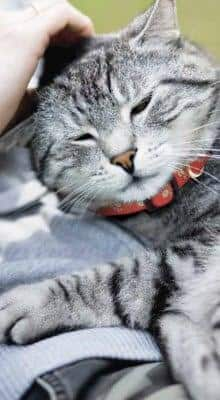
Because of advances in medicine and nutrition in the last few decades, cats are living longer than ever before. It’s not uncommon for them to reach their late teens, and some cats even get into their twenties nowadays. Whether you’ve had your cat since they were a kitten or adopted them later in life, caring for a senior cat can be wonderfully rewarding, but it does come with its own challenges.
Cats love to live life in three dimensions, climbing and exploring and watching the world go by from on high. With this in mind, it’s not only health issues that pet parents need to bear in mind with older cats but their lifestyle as well. In this article we’ll look at the common health problems that old cats face and how you can make changes in your home to keep them comfortable and happy in their senior years.
When is a cat old and what are the signs of ageing?
According to Blue Cross, cats are mature at around 7 years of age with an average lifespan of 12–13 years, although some cats can live up to 20 years or longer. As your cat tiptoes towards double figures, you might start to notice some changes. The common signs of ageing in cats are:
- Sleeping more and/or changed sleeping patterns
- Unkempt fur due to difficulty grooming
- Reluctance or inability to jump onto higher surfaces or furniture
- Brittle claws due to reduced time using scratching posts
- Bad breath
- Toileting accidents
- Weight gain or loss
- Behaviour changes
- Balance problems
- Drinking more than usual
Your cat will get a thorough physical check up every year when they have their vaccinations, but as your cat gets older, it’s a good idea to increase this to every 6 months. Over the age of ten, your vet may recommend a yearly blood and urine test to check organ health and the immune system. In the super senior years, your vet may recommend these blood and urine tests every 6 months. Remember that each year for us is equivalent to around 4 years for your cat, so more regular check-ups make sense. What will your vet be looking out for in these checks?


Tasty Tips
Common health problems in old cats
As with us humans, the likelihood of disease and health problems in pets increases with age. The body starts to show signs of wear and tear from all of life’s adventures, and organs start to work less efficiently.
- Joint disease. The medical term for this is osteoarthritis or arthritis for short. Cats love to climb and jump, and after years of this impact and effort, the joints start to get damaged. Any joints can be affected, as can the spine. This will make it more difficult for your cat to jump up, groom themselves and crouch to go to the toilet. The majority of older cats have some degree of osteoarthritis, but since they don’t always show pain, it’s difficult to detect without x-rays. It’s safe to assume, though, that very senior cats will most likely have some degree of osteoarthritis.
- Kidney disease. Behind joint disease, kidney disease is one of the most common health issues in older cats. The kidneys have a big reserve, so you don’t usually see signs of issues until they have lost about 70% of their function. You may notice your cat drinking and weeing more than usual, and they might start to go off their food, lose weight and have bad breath.
- Hyperthyroidism. The thyroid gland is like the body’s internal thermostat, and it controls our metabolism. Older cats are prone to benign tumours in the thyroid, which produce too much of the thyroid hormone, turning up the thermostat and sending the body into overdrive. Your cat may eat ravenously but lose weight. They may vocalise more than normal and be very restless or even aggressive.
- Dental disease. It’s a good idea to look after your cat’s teeth from as young an age as possible, preferably with brushing. As your cat gets older, they may be more prone to plaque, tartar build-up and gum disease. Teeth may get cavities or become chipped or cracked. Your vet may recommend cleaning under anaesthetic, and teeth may need to be removed.
- Cognitive dysfunction. Just the same as in humans, cats can get dementia or cognitive dysfunction syndrome. They might start to have broken sleep patterns, seem confused, lose their house-training, vocalise more than usual and be less responsive to you.
- Cancer. This is more common in old cats, and any signs you see will depend on the organ or organs that are affected.
The blood and urine tests and the physical exam that your vet performs will help to diagnose or rule these things out. The blood and urine tests are a way to catch these problems as early as possible, hopefully before the disease is advanced. There are many treatment options available now, as well as therapeutic diets that can make huge differences in your cat’s quality and length of life while living with these issues.
How can you help your senior cat?
In addition to keeping up to date on your vet visits, there are lots of things you can do at home to make your cat’s later years as easy as possible.
Feeding a senior cat
If your cat doesn’t have any health issues, you should feed them a mature or senior cat food, depending on their age. These have slightly different mineral and protein levels to take some of the strain off the organs. Foods for older cats tend to be lower in calories because less active cats are likely to gain weight. Some senior foods may have more calories because super senior cats may struggle to maintain a healthy weight and muscle mass. Ask your vet what food to feed your cat given their age, lifestyle and body condition. Keeping them slim throughout life is proven to increase their lifespan.
Old cats tend to have reduced taste and smell, so you might want to offer different flavours and textures of food to encourage your cat to eat. Warming food slightly makes it more palatable, too. If your cat has dental issues, you may find they prefer wet food such as tins or pouches, or you can try soaking their biscuits in warm water to soften them.
It’s not just what you feed your cat, but how. As we said, older cats usually have some level of joint disease. It may be painful for them to crouch to eat or put their head down. Feeding from a step or putting the bowl on a small box can help them eat more comfortably. Feed them somewhere quiet, away from the hustle and bustle of a busy kitchen.
Your vet may recommend a therapeutic diet if your cat has been diagnosed with an illness such as the aforementioned arthritis. Some diseases, such as kidney disease, can be difficult to spot because you don’t see signs until the disease is advanced. Your vet will recommend blood tests more frequently as your cat ages to detect these conditions early. Remember never to feed your cat a therapeutic diet without the say-so from your vet.
Water is always important but as your cat gets older, keeping them well hydrated is even more important. Feeding them wet food or soaking their kibble is the easiest way to ensure water intake. Fountains are also popular, as many cats prefer to drink running water. Try to put several water bowls around the house so that your cat never needs to go far to get a drink.
Coat and claws
Cats are well-known for being fastidiously clean and grooming for hours a day. As your cat becomes less comfortable doing this, you should try to help out. Remember to groom them gently because they may be sore.
Arthritic cats find it more difficult to stretch in order to scratch and keep their claws in good condition. Try to provide horizontal scratching posts. Keep an eye on their claws and trim them if they are starting to get too long. Ask your vet or vet nurse to show you how to do it if you have any doubts.
Home comforts
As your cat gets less mobile, you can try to make adjustments in the home to accommodate them. Cat ladders and ramps can ensure that your cat can still feel safe and sleep in their favourite high places. Make sure their beds are super comfortable for those creaky joints.
Even if your cat has access to the outside, you should provide litter trays, preferably with low sides so it’s easy to get in and out. Old cats want to stay warm and dry and close to home, so they might stop going outside or go less often, and you may end up with accidents. Make sure the trays are away from their food and water and also in a quiet place.
Looking after mental health
We mentioned cognitive dysfunction, and you can help with this by keeping your cat mentally stimulated. Puzzle feeders and similar cat activity centres can be a good way to keep your cat’s brain young and active.
The golden years
You can see that, just like us, the golden years for your cat come with challenges, but those years can be some of their best. By watching out for signs of ageing, ensuring regular vet visits and following these home care tips, your older cat can have a happy, cosy and comfortable retirement.
Senior cat health problem FAQs
- At what age is a cat senior? 11+ years.
- How do I know if my cat’s in pain? Watch for reluctance to jump up on or down from furniture. Watch for stiffness after sleeping and limping. A poor coat is also one of the signs of pain because your cat has stopped grooming.
- Why is my cat drinking so much? This is one of the first signs of many diseases such as diabetes and kidney disease. If you notice any change in your cat’s appetite or thirst, always see your vet.
- Can cats get dementia? Yes. You can read more about that here.
- Do I need to change my cat’s food? Around the age of 7 years, your cat should have a mature cat diet and later, a senior life stage food. Your vet may recommend a therapeutic diet if your cat is diagnosed with a disease.
Reviewed by Dr. Hein Meyer, DVM, PhD, Dipl-ECVIM-CA and Dr. Emma Milne BVSc FRCVS.


One of our staff authors prepared this article for you
Related products

Hill's Science Plan Oral Care Adult Cat Food with Chicken contains clinically proven kibble technology to reduce plaque & tartar build up.
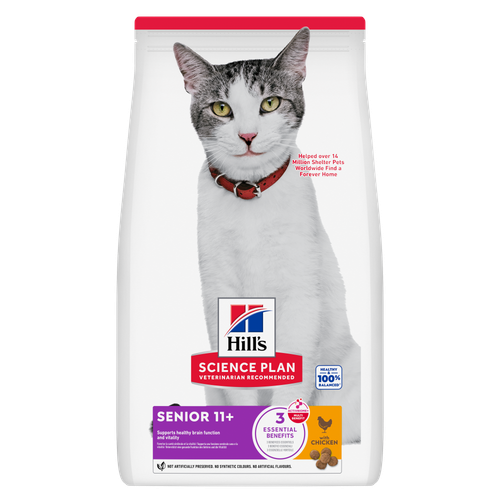
Hill's Science Plan Senior Cat Food with Chicken is a complete pet food, specially formulated with ActivBiome+ Multi-Benefit Technology.
This food supports healthy aging during the golden years. Contains a special ingredient blend to help keep older cats agile, more alert & interactive.

Hill's Science Plan Urinary Health Adult Cat Food with Chicken supports the health of the whole urinary system. Suitable for sterilised cats.

Hill's Science Plan Sterilised Cat Mature Adult Cat Food with Chicken is specially formulated with ActivBiome+ Multi-Benefit Technology. It is a precisely balanced nutrition tailored to meet the needs of mature adult sterilised cats, ages 7+, and to promote graceful ageing.
Related articles
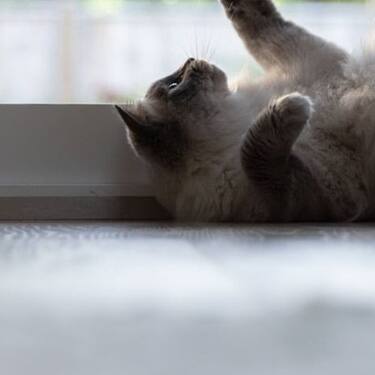
Feeding time can be a wonderful bonding opportunity for you and your cat. Find out how to make the most of it and create a healthy habit with HIll's Pet UK.
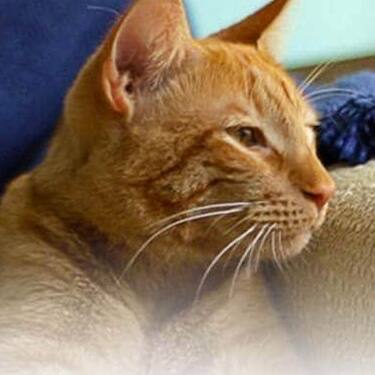
Find the right Hill
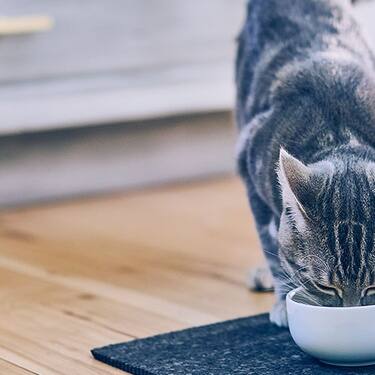
Good nutrition is about the right balance of nutrients. Learn more about health issues when feeding a cat food that has an improper nutritional balance from your friends at Hills Pet Nutrition.
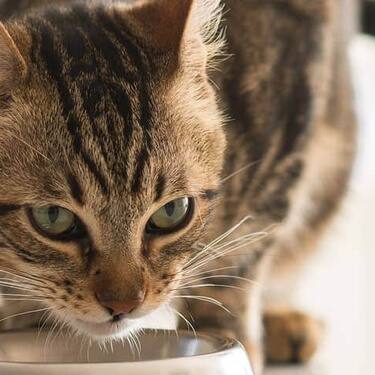
Discover what you can do to spot and support a sensitive cat stomach. See what routines and food you can implement to help your cat be happy and healthy.

Put your cat on a diet without them knowing
Our low calorie formula helps you control your cat's weight. It's packed with high-quality protein for building lean muscles, and made with purposeful ingredients for a flavourful, nutritious meal. Clinically proven antioxidants, Vitamin C+E, help promote a healthy immune system.
Put your cat on a diet without them knowing
Our low calorie formula helps you control your cat's weight. It's packed with high-quality protein for building lean muscles, and made with purposeful ingredients for a flavourful, nutritious meal. Clinically proven antioxidants, Vitamin C+E, help promote a healthy immune system.

